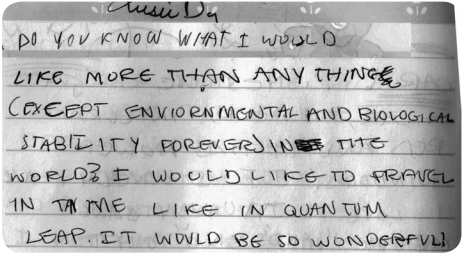| Book: Category: Title: Author: Date Completed: | 26 A memoir You're Never Weird on the Internet (Almost) Felicia Day 04.12.2015 |
I first came across Felicia Day while watching the web series Doctor Horrible's Singalong Blog, which is a musical starring Neil Patrick Harris as an aspiring supervillian and Nathan Fillion as his jerkass superhero nemesis. (I definitely recommend checking it out if you haven't seen it.) But I didn't put a name to her face until a few years later, when I saw her in some videos on the YouTube show TableTop - in which Wil Wheaton plays board games with a few of his friends. I thought she was really funny and always seemed to be having a good time playing games for a living, but it was a throwaway comment she made on during one of the TableTop episodes that especially drew me to her. It turned out that, like me, Felicia Day was a music major. I've often been told that music is a hobby, not a viable career option, so encountering a person who had studied music at university (and managed to make a living out of it) made me feel a lot more confident about my own choice of degree. I was encouraged that there was still a possibility that I wouldn't end up spending most of my adult life in unfulfilled, penniless misery. It sounds sort of pathetic as I write it out, but at the time I found it really affirming to know that someone that I admired had made the same degree choice that I had.
So, when I saw that Felicia Day had written a memoir, of course I bought and read it. And, in all seriousness, I loved it. The writing style was casual and personal, the topics that Felicia chose to talk about were interesting and relevant, and she managed to highlight some serious issues in a funny, lighthearted manner without trivialising the content.
The book starts with Felicia talking about her eccentric, home-schooled childhood, and her life at university. I enjoyed reading the precociously cute diary entries she had written as a little girl and learning about some of the antics that she and her brother got up to as kids.
| Unfortunately for my sense of solidarity with a fellow music major, however, it turned out that Felicia had been something of a music prodigy, which I most certainly am not. She had attended university as a young teenager and was an expert violinist. (And she could sing, too, as demonstrated by her performance in Doctor Horrible's Singalong Blog, mentioned above.) But even though her music abilities far exceeded my own, I could still identify with her problems with social anxiety. Felicia's frank, open style of discussing her own feelings of awkwardness around her classmates and lecturers, despite being provably extremely talented, kept her story accessible and amusing. |
She also wrote openly about her struggle with gaming addiction, which I found really interesting. I've (thankfully) never experienced this problem myself, but I've known people who have, and reading this section of Felecia's memoir really gave me a deeper understanding of the condition. The descriptions of denial, lost 'real world' relationships, created 'in-game' friendships, and involvement with a support group were extremely moving, and I felt invested in her experiences and journey.
For this reason, I was particularly heartened to read about her recovery process, which was aided by producing and working on the webseries The Guild. The series was based on the gaming community, which she of course had an in-depth understanding of, and it was really nice to see how she used something as parasitic as an addiction to create a work that was loved by so many people. As well as this, there was an enlightening glimpse into the world of movie-making, which I found really fun to read. I even sought out The Guild series and binge-watched the entire show in one evening... I regret nothing!
In a similar vein to the addiction, I really liked the way Felecia tackled writing about her later experiences with burnout, depression and online harassment (i.e. #gamergate). Although these were some pretty sobering subject matters, Felecia managed to include enough mood-lightening humour to balance her more serious content. I thought she wrote very astutely about depression, giving words to feelings that are difficult to express, and I found some of the nasty things people online had done to her really chilling: from death and sexual assault threats to having her home address posted online. At one point she described having received a frightened phone call from her colleague, Wil Wheaton, telling her that she needed to disable the comments on one of her blog posts because there were people posting very personal details about her. Reading this passage and her subsequent ordeal trying to take the comments down while not actually being able to access the internet for herself (on account of having no signal) was pretty harrowing for me as an observer - how awful it must have been for her at the time. It is horrifying that people would be so callous.
I really admire her writing style during the sections about the online harassment; she was surprisingly rational and level-headed. There was anger but it was never unjustified and, while she didn't make allowances for out-of-line behaviour, she wasn't needlessly provocative, either. The occasional joke certainly relieved tension while maintaining the seriousness of the situation.
I don't tend to read memoirs very often (the only others that I've completed were comedian David Mitchell's book Backstory and Forever Liesl by actress Charmian Carr). I don't know why I haven't read more of them; I've highly enjoyed the three that I have read. I really like Felecia Day's style of acting, and presenting, and also, it turns out, writing. It was a fun and enlightening book. I thought it was great.

 RSS Feed
RSS Feed
